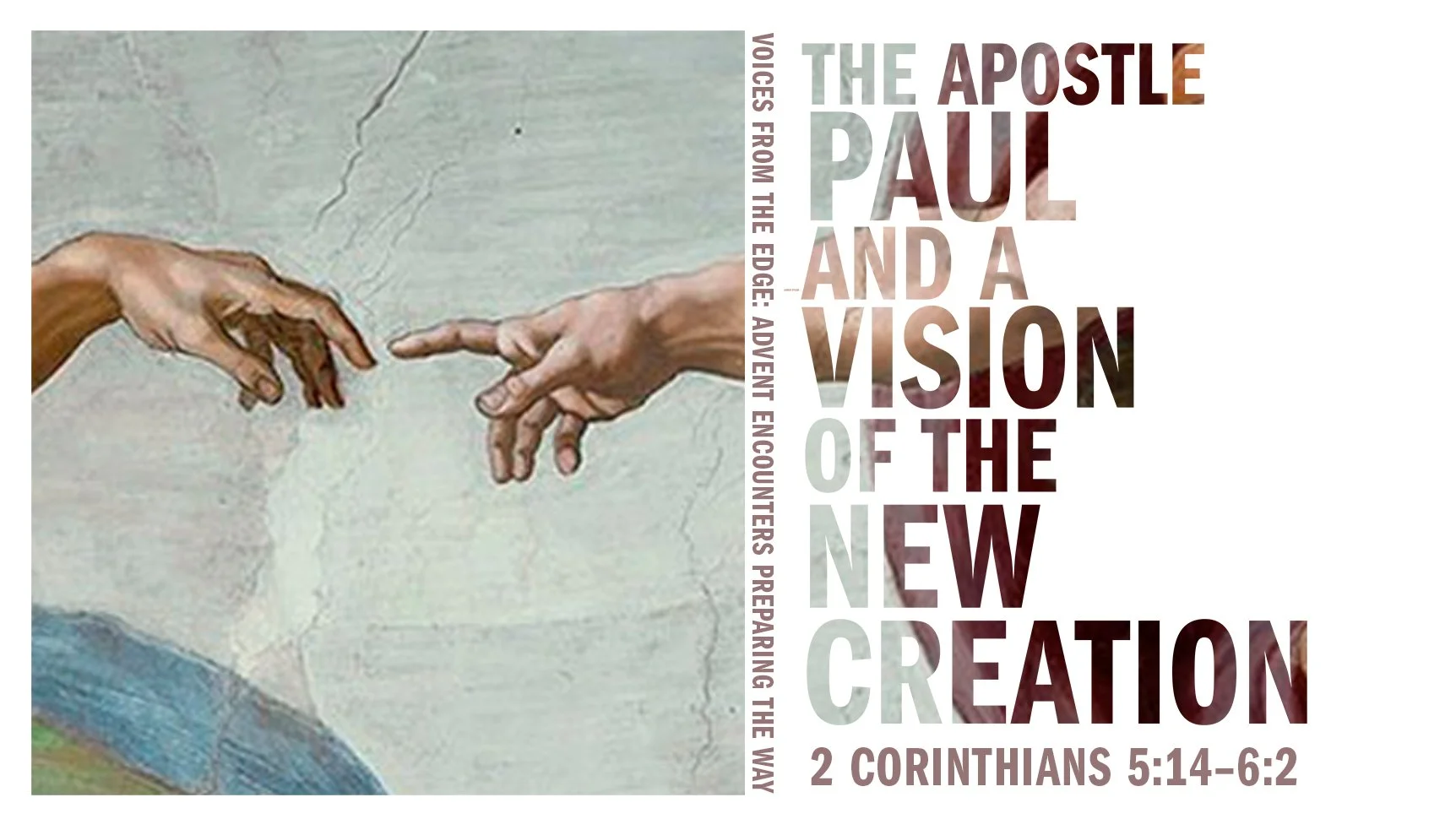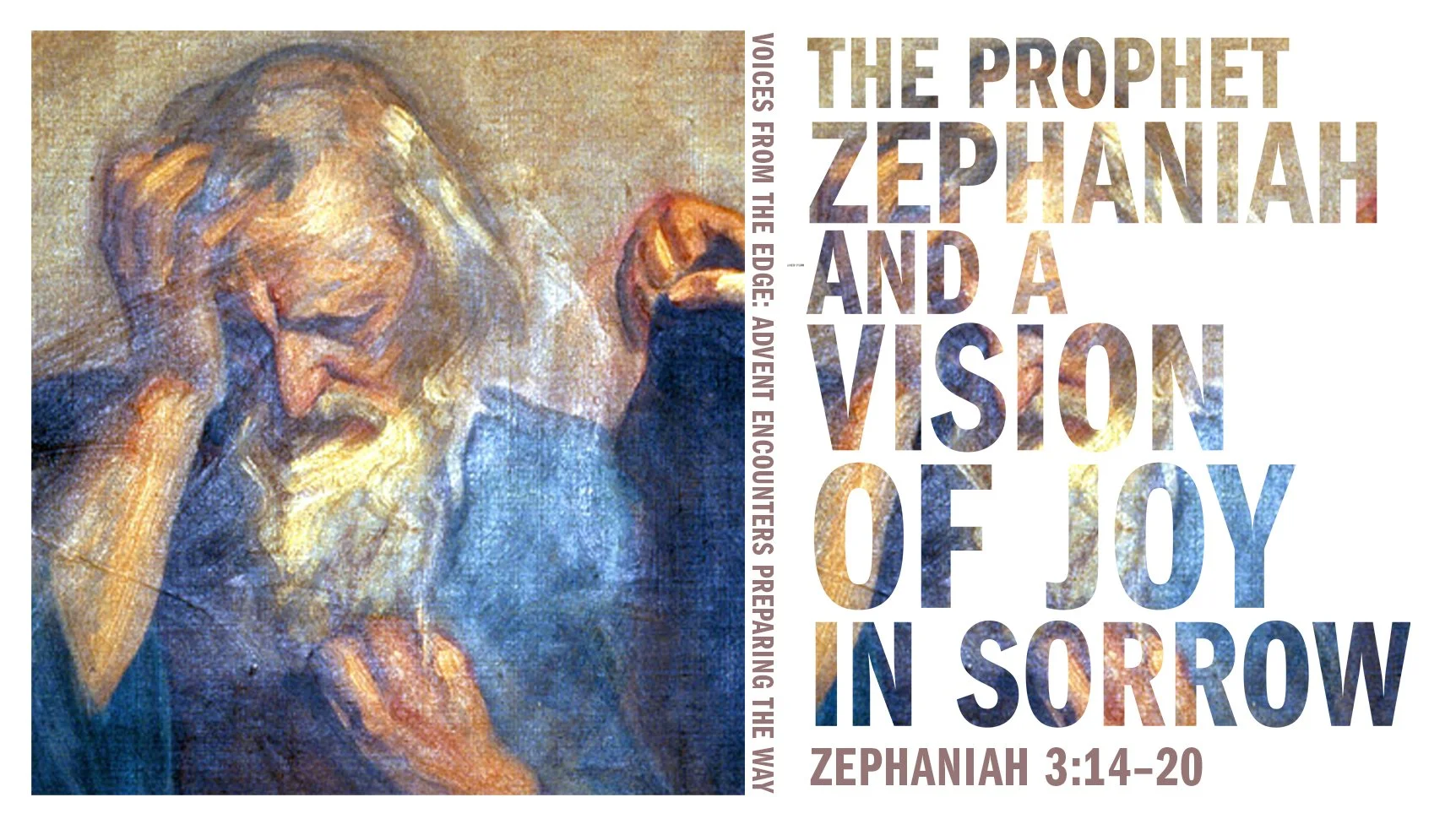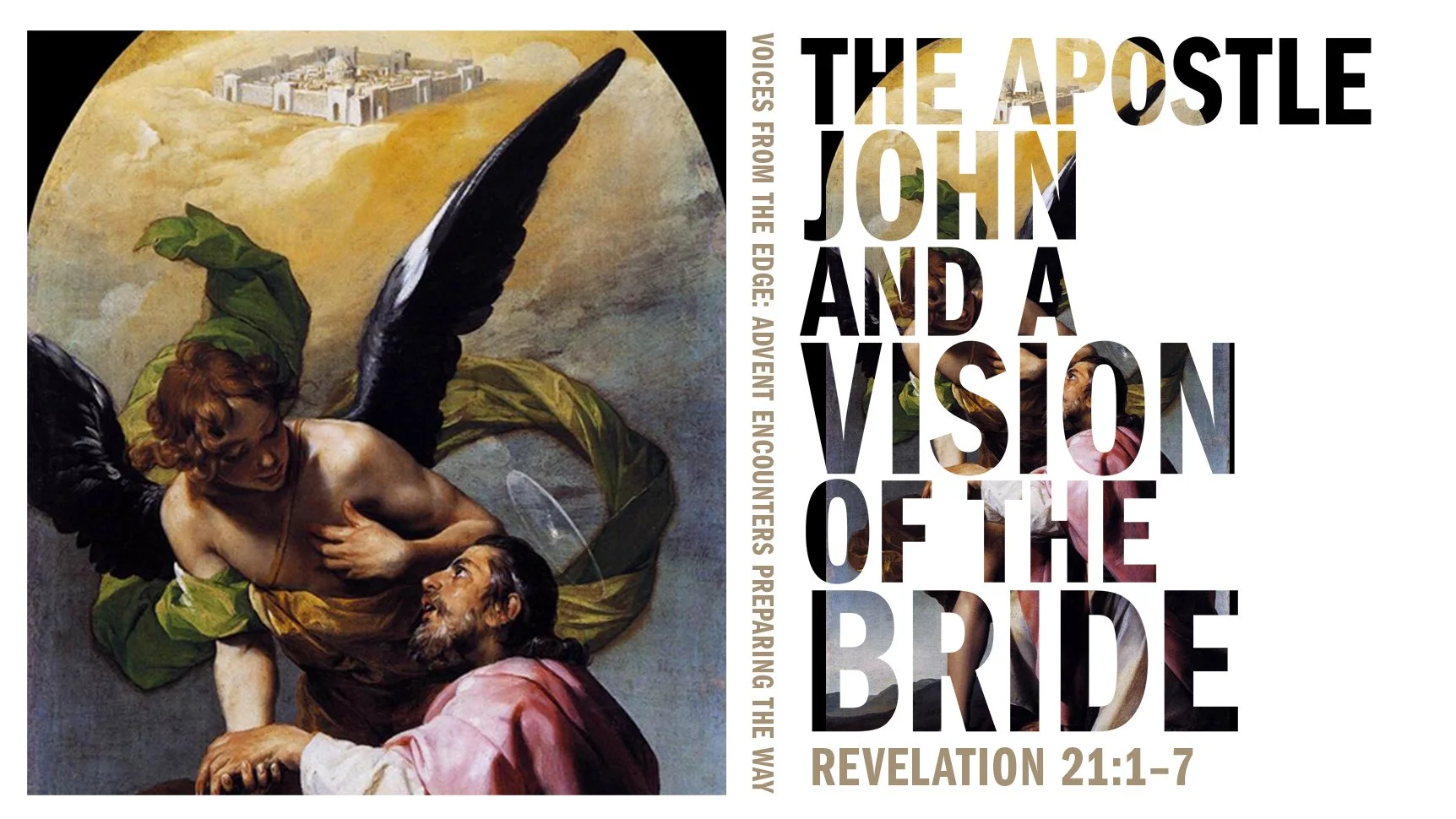The Prophet Zephaniah and a Vision of Joy in Sorrow | Third Sunday of Advent | Zephaniah 3:14-20;
December 12, 2021 | 10:45 a.m.
Third Sunday of Advent
The Triumph of Religion (detail) John Singer Sargent, c. 1890-1919
The season of Advent is punctuated with one Sunday of joy. Sometimes it is seen in a pink candle on the Advent wreath. Other times it is heard in the introit that cries out “Rejoice.” That moment of joy introduces something paradoxical into our Advent preparation: joy in the midst of sorrow.
The collect for Advent 3 captures this experience with our petition to Christ: we ask that he would “lighten the darkness of our hearts by [his] gracious visitation.” In the midst of our darkness, we have hope in his light. In the midst of our repentant sorrow, we anticipate the fullness of his joy.
This sermon focuses upon the strange figure of the prophet Zephaniah. His vision at the end of his book introduces us to a peculiar kind of joy: Advent joy. This is not joy without sorrow but joy in the presence of one who comes to us in the midst of our sorrow. This voice and this vision invite us to experience the paradox of Advent joy as we prepare for our Lord’s coming.
Repentant Reorientation:
In each sermon of this series, a voice from the edge reorients our way of life in the world. In this particular sermon, that reorientation is a change from experiencing joy as the absence of sorrow to experiencing joy in the presence of Christ who comes to us in the midst of our sorrow.
This sermon addresses the following malady: the way in which we are tempted to think of joy as the absence of sorrow. Compassionate acts for those who are suffering are wonderful ways to demonstrate Christ’s love. We need to be careful, however, that we don’t allow our ability to alleviate some forms of suffering to cause us to confuse joy with the absence of suffering. That is what sentimental visions of Christmas (seen in everything from advertising to classic Christmas films) tend to do. They ask us to believe that true joy involves the absence of suffering, as problems are resolved and old enemies become friends just in time to celebrate the joy of Christmas.
Consider how isolated this makes many people feel during our world’s holiday season. While the world celebrates joy, some people feel distanced from the celebration. The death of a family member, the diagnosis of cancer, the loss of a job, these are things that nobody wants to hear about when they get together for a Christmas party. And so some people remain silent during this time of the year. They suffer but they suffer alone. They can even feel distanced from church, as if their sorrow should not be seen, their voices not heard, because their suffering makes them not belong.
It is for these silent sufferers that this sermon is written. It stresses the paradoxical truth that Christian joy in this world is joy in the midst of sorrow. We have joy not in the absence of sorrow but rather joy in the one who comes to us, Jesus Christ, in the midst of our sorrow. Such paradoxical joy is found frequently in Scripture. In the midst of laments, psalmists sing for joy. Isaiah brings good tidings to people in exile. When the apostle Paul writes his familiar encouragement to the Philippians, asking that they “rejoice in the Lord always,” he is writing from prison.
When we encounter joy in the Scriptures, if we expand our lens just a bit, we will often find that this joy is in the presence of God who comes to us in the midst of our sorrow. God, in his steadfast love, will not leave his people alone. He will enter into their suffering and bring them his joy: joy that, in this world, may not take away the experience of suffering but will fill it with his presence. Therefore, when his people mourn (and they will mourn because there is sorrow in their lives), they do not mourn as those without hope (because there is joy in Christ).
The gospel proclamation of this sermon explores the mystery of Zephaniah’s proclamation of joy in the midst of sorrow. Using the images and language of the prophet Zephaniah, this sermon proclaims Christ as the one who is fully present with his people in the midst of the suffering of judgment. Jesus bears God’s wrath that he might bring God’s presence to us in the midst of our sorrow and, by doing that, he makes a place for all people, especially those who suffer, when the church gathers to prepare for Christmas.
READINGS
Psalm 95:1-7
Zephaniah 3:14-20
Philippians 4:4-7
Luke 6:17-26
Message presented by Elder Donald King.
+Points to ponder
- What is the peril of pitting joy against sorrow?
- Can you think of a time or event in your life that you experienced joy in the midst of sorrow?
- How are Zephaniah’s words for our reading – and in the context of the book of Zephaniah – comforting?
+Sermon Transcript
Grace, mercy, and peace be unto each of you from God our Father and our Lord and King, Jesus the Christ. Amen.
Let us pray: Almighty God, purify our hearts and minds, that when Your Son Jesus Christ comes again as judge and savior, we may be ready to receive Him, who is our Lord and our God. Amen.
I’d like to begin by telling you a story about a story. Imagine, if you will, a professor of preaching and his encounter with two students in his honors class. It is a true story and the names have not been changed – no point in protecting the guilty.
Dr. Schmidt shares a story of two seminary students who sat together in one class. A class on preaching. If you were to talk to the professor, he would tell you that he didn’t want that class to end because of the way these two students interacted in that class. One student used to work for Disney. His name was Brent, and it was wonderful to see his creativity. As Brent listened to the texts of Scripture, he could imagine worlds of God’s grace. He would invite people into the halls of God’s kingdom, and they could hear the walls resounding with joy. But sitting behind him, and one seat over, was another student. Frank. Frank had worked for the opposite of Disney – which would be Death. Well, he didn’t actually work for Death, but he sure hung around a lot where Death had done his work. Frank used to be a homicide detective. One day, after class, he brought in a photo album for everyone to look at and it was unlike any other photo album they had ever seen. It wasn’t full of pictures from a Disney family vacation. Instead, it was full of dead bodies. He had taught a course on wound identification – yea, you thought your job was bad – He taught a course on wound identification, and these were pictures of the bodies with the wounds he helped people identify. As Brent imagined life; Frank revealed death. Real death.
Watching these two interact with the word of God was amazing throughout the class. The professor liked to play the two off of each other. When Brent would help the class imagine life, fill their minds with the dreams that God has for his people, Frank would wake them up and bring them back to reality, a world of suffering and death. When Frank would imprison them with the harsh reality of sin and God’s judgment in the world, they could always turn to Brent for an escape. “Mr. Disney, could you please sing us one of those songs of Zion?”
As the professor said, he had a great time in that class, and he didn’t want it to end. But he’s glad that it did. Because, if it had not ended, none of the students would be prepared to stand up among God’s people and preach, particularly from a text like this one from Zephaniah. You see, what was happening in that class was that they were beginning to pit joy and sorrow against one another. Frank gave them sorrow; Brent gave them joy. They were starting to imagine that faith, in this world, was about having joy without sorrow. As if joy was the absence of sorrow. As if we can’t rejoice, we can’t celebrate Christmas, until we get rid of all of the sorrow in our lives. And yet that is not how God would have us prepare for Christmas. Getting rid of all of the sorrow in our lives in order that we might have Christmas joy. And so, during Advent God invites us into a classroom of his own. Into the words of Scripture, into the stories of sorrow and joy to prepare us not only for a celebration of Christmas but a life-long following of Christ in this world. God’s stories are of people. People who have joy. But it is not joy in the absence of sorrow. No, God shows us a peculiar joy, a holy joy, an Advent joy in the lives of His people. In these stories, God reveals joy in the presence of someone who comes to us in the midst of our sorrow.
Consider the apostle Paul and his letter to the Philippians. Paul writes to the Philippians and tells them to rejoice in the Lord always. Rejoice in the Lord always. Wonderful encouragement. Yet Paul writes these words from prison. For some people, prison would not be a place to be talking about joy. If joy were the absence of sorrow, then there would be no joy in a letter from prison. But God asks you to see the peculiar joy of Paul. Though his hands are chained, his heart is free. Paul knows that joy is not the absence of sorrow. No. Joy is found in the presence of the Lord who is with him in the midst of his sorrow.
Or consider John the Baptizer, suffering in prison, awaiting his execution. He sends messengers to ask if this Jesus is the one who is to come or if they should look for another. And Jesus sends John’s messengers back with a song of joy from Isaiah on their lips. If joy were the absence of sorrow, this would be a cruel joke. While John is dying, Jesus sings for joy. But Jesus knows that joy is not the absence of sorrow. No, joy is found in the presence of someone who comes to you in the midst of your sorrow and so Jesus sends John a word that brings Him, the Word, in all of His grace; a word that brings hope into the midst of John’s suffering. The same thing is happening in our text from Zephaniah this morning.
Now, I must admit that that there doesn’t seem to be much sorrow when you first read this text. Reading these few small verses can evoke the world of Disney. Joy is ringing and running around the text. But this small text is only a few verses from the book of Zephaniah and if you read the book of Zephaniah, it is nothing like this text. Reading the whole book of Zephaniah is a lot like paging through the Homicide photo album. It’s full of dead bodies. Zephaniah’s vision of divine destruction is devastating. The dead are scattered everywhere. The book opens with the grand sweep of God’s judgment. God says, “I will utterly sweep away everything from the face of the earth. I will sweep away man and beast, I will sweep away the birds of the heaven and the fish of the sea … I will cut off mankind from the face of the earth.” The book opens with that grand sweep and then it continues with the particulars. God judges all, the priests and the people, the rulers and the merchants, the warriors, and the laborers, and like a nightmare God continues to judge late into the night. Zephaniah sees Him, wandering around with a lantern, seeking yet more people to destroy. The dead are scattered everywhere. Perhaps the most horrifying vision is when Yahweh prepares a sacrifice in the midst of the nations. Since His people have abused the sacrificial system He gave them, Yahweh enacts His own sacrifice in judgment. Only this time, the victim sacrificed on the altar is not a bull; it is His very own people. He places them upon the altar and sacrifices them, as the nations gather and watch in horror at this spectacle of judgment.
Then, at the end of this horrifying photo album, we have this one small picture of joy. When we remove it from the book and sit here with it alone in the service, we can easily create the illusion of a family vacation at Disney, of joy without sorrow. Yet Zephaniah’s joy is not joy without sorrow, it is joy in the presence of one who comes to us in the midst of our sorrow.
Here, we could learn from Frank and do some wound identification. What do we learn about God from the wounds he has inflicted? First, we learn that God rules over all nations. His judgment extends to all social classes, throughout all nations, and lasts for all time. You cannot get away from it. Second, we learn that God’s power is overwhelming. No one can resist him. He is the one who creates, and He is the one who destroys. But third – and here is where I would encourage you to trust that God can use your imagination – third, Yahweh is present with His people in the midst of judgment. In that most horrifying vision of the sacrifice of His very own people, I believe we get a glimpse of God with us in Christ. God is most fully present with us in the midst of His judgment. Jesus is Israel reduced to one. He is that one body sacrificed on the altar, bearing the eternal punishment of our sin. Here, we see that Yahweh will not leave His people alone in His judgment, but rather comes for them in the midst of His judgment.
Jesus is the one who bears the Father’s wrath for us. He becomes the sacrifice that takes away our sin and He is the presence of God in the midst of our sorrow. This death is not the reluctant death of someone who begrudgingly gave his life. It is not, as some theologians wrongly say, a strange form of divine child abuse – the Father killing His Son. Instead, it is the mystery of joy and sorrow joined for eternity in the relationship of the Father and the Son. The Son in joyful sorrow offers His life for you. The Father in sorrowful joy receives you on the arms of His dying Son. And when that Son rises and ascends into heaven and sits at the right hand of the Father, He still bears on his body those wounds. Father and Son in joy and sorrow joined together forever for you. And now the Spirit works through this word to bring this presence of Yahweh to you.
That is what Zephaniah is singing about at the end of his book. That is the joy that Zephaniah utters in amazement, the joy of the presence of God with his people in the midst of their suffering. God in the midst of His people runs like a refrain throughout this text. Zephaniah proclaims, “The Lord your God is in your midst, a mighty hero who will save. He will rejoice over you with gladness. He will quiet you with His love.” Yahweh will rejoice over you with gladness because all judgment is taken away. Yahweh will quiet you with His love because nothing can separate you from Him. Zephaniah invites us here to see joy and sorrow together in the eternal love of God.
This is a hard word for us to understand, but it is necessary. Especially as Christmas approaches and we prepare to celebrate God in our midst and to sing “Joy to the World.” What is the joy we are offering?
There’s a Christian woman who once didn’t want to go to church. Well, she wanted to go to church, just not her church. She had recently been through some rough times. Her husband died in an automobile accident, leaving her with two small children and one large house. One weekend, she called and asked a friend if they could go to church. He said, “Sure. What time are your services?” And she said, “No, I was hoping to go to your church.” And then she explained. She didn’t want to go to her church because she felt like she didn’t belong there. She had been back since her husband’s death, and she felt alone in the pew. She felt alone because her husband wasn’t with her. But she also felt alone because her church wasn’t with her. “It’s as if I don’t exist,” she said. Her church was a place set apart for praise. They had a variety of music styles and uplifting messages that brought people to their feet with their hands in the air. Unfortunately, their worship services tried to create joy by denying all sorrow.
Consider this woman. When all was going well in her life, with a wonderful husband and two beautiful children, she felt like she belonged. But then, when sorrow came to her home, knocked on her door, and decided to sleep in her bed, waking her up, alone, in the middle of the night – she didn’t feel like she belonged anymore. Her church celebrated joy as the absence of sorrow, and it didn’t give her the place or the language to express her sorrow. It didn’t proclaim the presence of someone in their midst who rejoiced over her and comforted her with His love.
It is for people like her that God comes to us this morning. He comes to prepare a place of worship for her. A place where there is joy in the presence of one who comes to us in the midst of our sorrow. As God gathers us, there are joys we celebrate. The birth of a child. A positive response to chemotherapy. And there are sorrows we mourn. A divorce. A grandmother developing dementia. The sudden loss of a loved one. These joys and these sorrows are brought before God in prayer. But in His word, God brings us Jesus Christ. He has come to create a place where all people and all nations gather before him. Why? Because He has taken away divine judgment, and now rejoices over you with gladness and quiets you with His love. This is God’s gift of Advent joy. Not joy in the absence of sorrow but joy in the presence of Jesus who comes to you in the midst of your sorrow. And the joy that He brings, like the wounds He still carries, is a joy that will never end. Amen.
“May the God of hope fill you with all joy and peace in believing, so that by the power of the Holy Spirit you may abound in hope.”
Background and Study notes from Rev. Dr. David R. Schmitt, Concordia Seminary, St. Louis: Voices From the Edge – Advent Encounters Preparing the Way
Advent has long been a time of preparation, preparation for the celebration of Christmas. Yet the road to Christmas is anything but easy. It twists, it turns, and we meet many strange figures along the way. Prophets cry out in visions. John the Baptizer preaches in the desert. Angels appear whether you are asleep or awake. The voices are varied, the places are strange, but one thing is certain: in each encounter, God is preparing us for the celebration of the greatest encounter of all, the birth of Jesus, his Son, our Savior, the Redeemer of the world.






